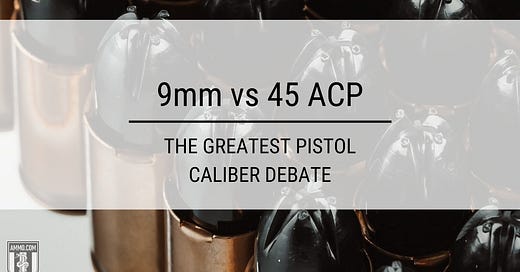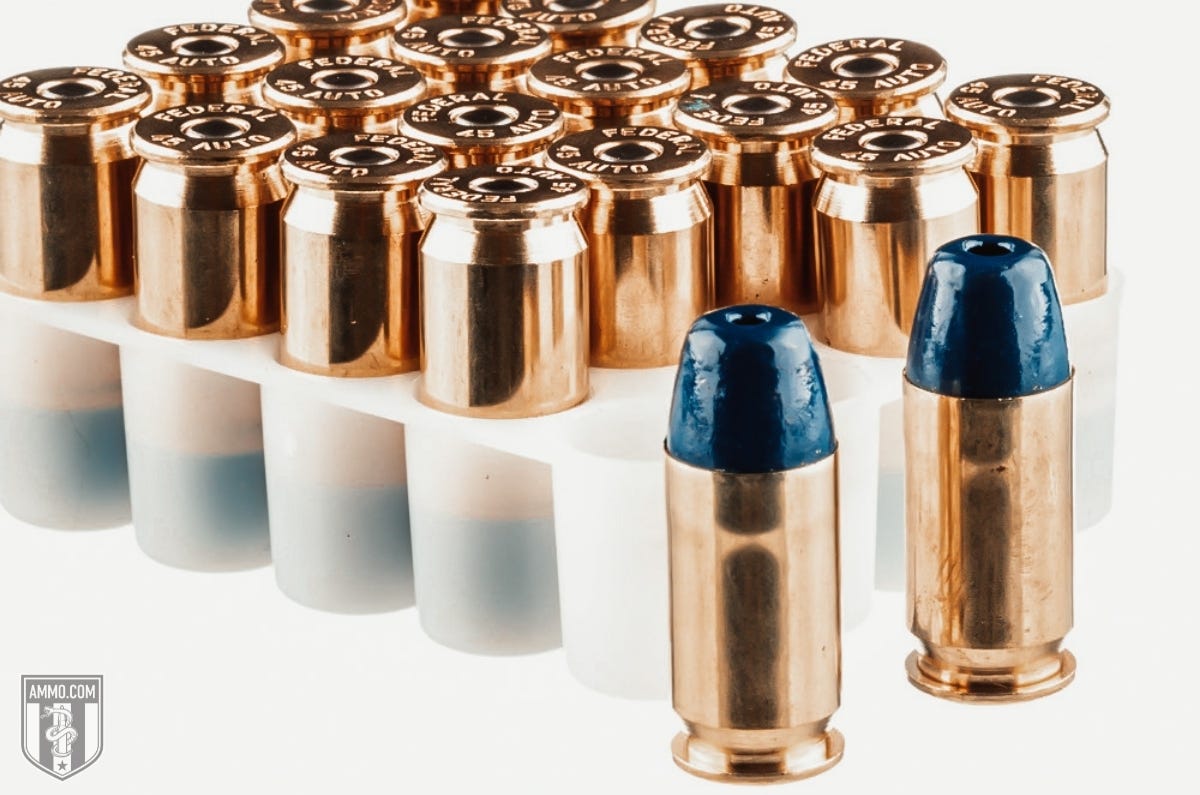9mm vs. 45 ACP:The Greatest Pistol Caliber Debate
Many shooters argue that the debate over 9mm vs. 45 ACP comes down to magazine capacity versus stopping power. However, this is a very apples-to-oranges approach when comparing these two personal defense rounds.
We’ll take an objective look and compare the ballistics, advantages, and disadvantages of two of the most popular self-defense cartridges in the world.
Load up your favorite Glock 17 magazines with your 9mm ammo of choice – or build a tiny, protective dam using the beavertail grip safety on your 1911 – because you are about to read the most objective 9mm vs 45 ACP caliber debate on the Internet.
Pros and Cons of 9mm
Pros
Higher magazine capacity
Less recoil
Wide ammo selection
Ammo tends to be less expensive
Wide firearm selection
Cons
Less stopping power
Pros and Cons of 45 ACP
Pros
More stopping power
Wide ammo selection
Wide firearm selection
Time-tested and provenly effective
Cons
More recoil
Lower magazine capacity
The Differences Between 9mm and 45 ACP
Is 45 ACP Stronger Than 9mm?
The 45 ACP is undoubtedly the superior cartridge when it comes to kinetic energy transfer. But how is "stopping power" defined? It cannot be quantified so easily, especially since so much of it is determined by shot placement, which is immeasurable. With that in mind, the FBI test protocol is widely accepted as the best assessment of a cartridge's efficacy for self-defense, which is certainly something akin to stopping power.
For modern 9mm JHP ammo, penetration is around 13-15 inches on average. In contrast, 45 ACP hollow point ammo will typically penetrate to a depth of 12-14 inches. For the most part, both will penetrate the same distance.
One major difference between the 9mm's .355" diameter bullet and 45 ACP's .452" JHP is this: their capacity for terminal expansion. In general, a 9mm bullet will expand up to 0.6", effectively doubling in diameter. The 45 ACP bullet also reliably doubles in diameter, although that means it widens until it is nearly 1" around.
In short, the 45 ACP is more likely to inflict a larger permanent wound channel inside the bad guy. That means additional blood hemorrhaging, higher probability of lacerating a vital organ, and an altogether more unpleasant time for the threat.
Since it gouges out a larger permanent wound cavity, transfers more energy to the target, and is (relatively) less inclined to over-penetrate, it's fair to say that the 45 ACP has more stopping power than a 9mm. Recent advancements in hollow-point technology have significantly improved the 9mm's performance, although the .45 ACP's bullet remains the larger and more damaging one.
But this is only part of the story! Let's continue on to magazine capacity.
Magazine Capacity
Proponents of 9mm pistols love to cite the fact that 9mm magazines have higher capacity than 45 ACP alternatives – and they are 100% correct.
A standard Glock 17 magazine holds 17 rounds of 9mm. A Glock 21 magazine? Only 13 rounds of 45 ACP.
The benefits of having more ammo during a life-threatening altercation go without saying. This gives the 9mm a distinct advantage. Any sensible shooter should prefer having more shots at their disposal over fewer.
Be aware of your state laws. Some states, like New York and California, restrict "high-capacity magazines". In these cases, the 9mm's higher capacity may not necessarily matter. A standard Glock 43 magazine holds six rounds of 9mm, whereas a Colt 1911 Defender mag holds seven!
All other things being equal, the 9mm allows you to carry more ammo. That is undeniably a distinct advantage over the 45 ACP.
Recoil
The 9mm Luger has approximately half the recoil of the 45 ACP. The 9mm cartridge fires a lighter bullet at a higher velocity, whereas the 45 ACP fires a heavier bullet at lower velocities.
Recall your Newtonian physics: "For every action, there is an equal and opposite reaction." That's why the heavier powder charge and bullet of the 45 ACP are going to generate heavier recoil than the 9mm, even if its muzzle velocity is significantly lower.
There is one caveat to this, though: firearm choice.
A classic steel-framed 1911 is considerably heavier than a polymer-framed Glock 21, M&P45, or Ruger SR45. That added frame weight is going to reduce the amount of recoil that reaches the shooter's hands.
This is the main reason why 1911 owners often state that the 45 ACP doesn't have much kick to it. In general, 9mm handguns have less recoil. That allows for faster follow-up shots, as less recoil leads to less muzzle rise (i.e., the physical force that throws the sights out of alignment).
Less recoil also tends to lead to improved accuracy and shot placement. And as I'm sure you're already aware, shot placement is the key to stopping a threat.
Many shooters find that they are more accurate firing a 9mm. This is often due to less recoil. The gentler-recoiling 9mm allows shooters to focus more on the fundamentals of shooting (trigger control, sight alignment, grip, stance) and develop good habits rather than bad ones, such as recoil anticipation.
Velocity and Accuracy
It's difficult to compare the accuracy of two handgun cartridges, as accuracy is largely dependent upon the shooter and the firearm being used.
Both the 9mm and the 45 ACP have won the CMP Pistol Matches at Camp Perry. All things being equal, there is no difference in accuracy between them.
There is one caveat here: muzzle velocity. As the 9mm round fires a lighter bullet at a higher velocity, it will exhibit less bullet drop at close range. That makes it a better choice for long-range shots.
Unless you practice like Jerry Miculek, it's unlikely you'll be taking shots with your 9mm over 25 yards.
However, should the moment arise when a long-range shot is required, the 9mm would allow you to compensate less for bullet drop.
Although the 45 ACP is not the best choice for long-range engagements, its lower muzzle velocity makes it an ideal candidate for suppressed fire. Being subsonic by design and having lower chamber pressure, the 45 ACP is easier to suppress than a 9mm.
There are subsonic (under 1,000 fps) options for the 9mm (i.e., 147+ grain loadings) that play nice with a silencer, but the 45 ACP is simply better suited for that application.
Home Defense and Concealed Carry
With advancements in hollow-point bullet technology, the gap in stopping power between the 45 ACP and 9mm has narrowed.
However, the fact that the 45 ACP has lower penetration makes it an ideal choice for home defense.
Although nothing can eliminate the risk of over-penetration, the fact remains that the 45 ACP bullet is less likely to pass through its target. (Always know what your backstop is and what lies behind your target. You are liable for every bullet you fire, even in a self-defense situation.)
The added weight of a 45 ACP firearm makes little difference when you only keep one at your bedside.
Furthermore, a heavier semi-auto pistol like a 1911 will soak up more recoil (and is also a viable club should you run out of ammo).
This is not to say that a 9mm is insufficient for home defense. You just run a greater risk of over-penetration (and incurring liability). Modern JHP bullets do reduce this risk, but 9mm still penetrates more than 45 ACP. Ultimately, you should not feel insecure using a 9mm for home defense.
Concealed carry is another issue entirely, as there are more factors to consider when assembling your EDC.
A handgun's weight and width play a significant role in comfort when concealed carrying. To that end, a heavier, thicker 45 ACP is less preferable for EDC than a 9mm.
There are many concealed carry permit holders who carry a 45 ACP every day. If they are willing to take on the added weight, then I say more power to them. The 1911 they swore they'd carry every day may get relegated to nightstand duty before very long.
The simple truth is that a 9mm pistol will be easier to carry. It is lighter, thinner, and can carry more ammo.
Read the full breakdown: 9mm vs. 45 ACP:The Greatest Pistol Caliber Debate








